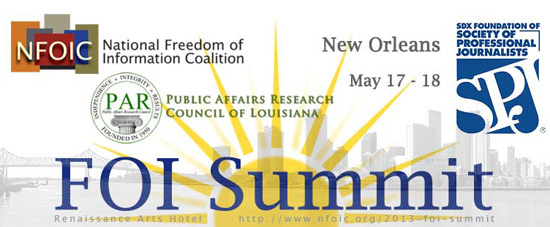Friday, May 17
- 2:30 p.m. – 6:00 p.m. — Conference Registration
- 3:00 p.m. – 4:00 p.m. — Yes, You CAN … on a Shoestring
- 4:15 p.m. – 5:30 p.m. — Ideas Marketplace
- 5:45 p.m. – 7:00 p.m. — Opening Reception
- 8:30 p.m. – 9:30 p.m. — Regional Coffee Klatches (Optional)
Saturday, May 18
- 8:00 a.m. – 12:00 p.m. — Registration
- 8:15 a.m. – 10:15 a.m. — Breakfast, Members' Meeting, Panel: The Deliberative Process 150 Years Post-Lincoln
- 10:30 a.m. – 11:45 a.m. — Not a Picayune Problem
-
12:00 p.m. – 1:45 p.m. — Keynote and Hall of Fame Luncheon
- 2:15 p.m. – 3:30 p.m. — Digital Dodges and the Email Sleight of Hand
- 3:45 p.m. – 5:00 p.m. — Technology and Access: Promise, Possibility and Perils
- 5:15 p.m. – 6:45 p.m. — Closing Reception
See brief bios of all speakers here.
Friday, May 17 |
2:30 p.m. – 6:00 p.m.Conference Registration |
3:00 p.m. – 4:00 p.m.Yes, You CAN … on a ShoestringPractical tips for the most vexing challenges facing NFOIC member coalitions, from effective ways to advocate for better open government and laws without running afoul of IRS lobbying rules to maintaining an effective Web presence and fundraising in an era when foundation money is hard to find and eroding business models are negatively affecting the generosity of traditional media-industry donors. Panelists include: Megan Rhyne, executive director, Virginia Coalition for Open Government; Hyde Post, journalist and consultant; and Anne-Marie Taylor, co-founder of Investigate West, and policital & nonprofit fundraiser. Moderated by: David Marcello, adjunct professor of law, Tulane University of Law School, and executive director, The Public Law Center. |
4:15 p.m. – 5:30 p.m.Ideas MarketplaceFOI advocates and coalition leaders from around the country talk about noteworthy success stories, problems they've encountered or just interesting tidbits worth sharing in an open but moderated, roundtable conversation. |
5:45 p.m. – 7:00 p.m.Opening ReceptionHors d'œuvre, conversation and cash bar. |
8:30 p.m. – 9:30 p.m.Regional Coffee KlatchesOptional, at each region's discretion. |
Saturday, May 18 |
8:00 a.m.Registration Opens |
8:15 a.m. – 10:15 a.m.Breakfast
|
10:30 a.m. – 11:45 a.mNot a Picayune ProblemHow is the changing news media environment and the gradual reshaping of the newspaper business affecting the use and effectiveness of freedom of information requests and other journalistic efforts on behalf of open and accountable government? Who in the media world are the new vanguards of public information advocacy, and what are their motives? New Orleans provides a microcosm of the nationwide trends taking place at the intersection of changing public media and open records. In the Crescent City, The Times-Picayune is transitioning out of daily publication, TV stations are ramping up their coverage teams, new investigative journalism outlets are taking hold and special interest bloggers are trying to make an impact. This panel looks at these developments and measures their impacts on public service. Panelists include: S.L. (Sherry) Alexander, associate professor; College of Social Sciences, Loyola University New Orleans; Steve Beatty, editor, The Lens; Tod Smith, president & general manager, WWL-TV, Inc.; and James O'Byrne, Director of State Content, NOLA.com | The Times Picayune. Moderated by: Peter Scheer, executive director, First Amendment Coalition (California). |
12:00 – 1:45 p.m.Keynote and Hall of Fame Luncheon
|
2:15 p.m. – 3:30 p.m.Digital Dodges and the Email Sleight of HandA panel of battle-tested experts discuss best practices and best outcomes when issues related to email and digital communications are legislated or litigated in your state. Are electronic records at least as accessible as paper records would be? Are retention policies adequate, without too much discretion given to records custodians themselves? Is anyone positing the silly notion that communications about government business become private if a sneaky underhanded public official uses his own personal computer or private email account? Panelists include: Robert Becker, attorney, chair of SPJ's D.C. Pro Chapter First Amendment/FOI and Government Relations Committee Chair, and board member, D.C. Open Government Coalition; Lori Mince, partner, Litigation Section of Fishman, Haygood, Phelps, Walmsley, Willis & Swanson; and Joey Senat, associate professor, School of Media & Strategic Communications, Oklahoma State University. Moderated by: Scott Sternberg, associate, Baldwin Haspel Burke & Mayer, LLC. |
3:45 p.m. – 5:00 p.m.Technology and Access: Promise, Possibility and PerilsIn an era when neither unmanned drones nor global positioning devices qualify as futuristic, technological advances have greatly expanded the capacity for access and citizen engagement. But they also give rise to concerns about privacy and other rights infringements. Some agencies understand that "public" now means online and are sharing their data with the public. In other instances, citizens have pried it loose and shared it. However, in the case of the gun database published by the Journal-News of Westchester, NY, or the controversial use of mug shots gathered by law enforcement, publishing without careful consideration and public communication can hurt the cause of freedom and give rise to unwanted new restrictions. A panel of experts discusses techniques and strategies for getting data and approaches for presenting it in ways that don't risk future access to that data, and also examines whether government policies should take into account what the public wants to do with data or any other public information. Panelists include: Daniel Lathrop, investigative reporter, Dallas Morning News; Barbara Petersen, executive director, First Amendment Foundation (Florida); Shawn Musgrave, project editor, MuckRock; Gordon Russell, Managing Editor for Investigations, The Advocate. Moderated by: Mark Horvit, executive director, Investigative Reporters & Editors. |
5:15 p.m. – 6:45 p.m.Closing ReceptionHors d'œuvre, conversation and cash bar. |

